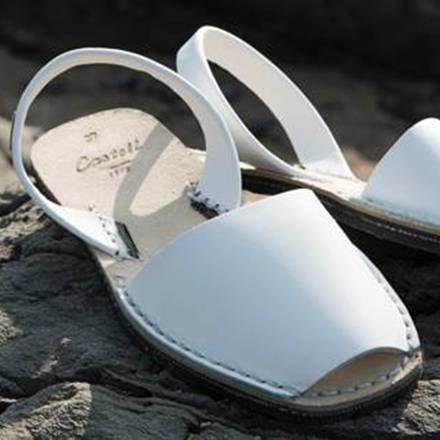
Despite being part of the heritage of the Balearic Islands as a whole, avarca sandals originated on the island of Menorca and therefore many people refer to them as "menorquines". Initially, the sandal was no more than a piece of leather tied to the foot used by the island's farmers. But over time, and with the arrival of cars, they became soled with rubber from tyres, a pioneering example of the recycling and reuse of materials. And Castell, the family firm today run by Pedro Castell, son of the founder of the company that has existed for "three generations", has made a contribution to this evolution.
"Avarca sandals for the whole family"
The company was founded in 1985 by Quilio Castell, who came from a long tradition in the footwear sector, as his parents also made shoes. When the company he worked for, Leo Marquès, closed, he began his own project "in a garage on a rural estate" where he did work for other brands. "At that time there was very little variety among avarca sandals, which were sold in traditional craft shops" says Castell, who explains that his father "innovated and created a rustic model with good materials better adapted to the feet, easier to wear." He went on to create "avarca sandals adapted for each member of the family."
Some time later, with two distributors of the Menorca avarca sandals and looking for cutting-edge machinery on the Peninsula, the firm began to stand out: "The lighter avarca sandals for women with a wide range of colours was very successful and produced a lot of business." The second generation of the family joined the business at this time. While Pedro took over the management, Juan Antonio took charge of the factory in the Ciutadella industrial estate -where they moved in 1995- and Ana took charge of the shops. On working with the family, Pedro says that "there has to be extra care taken over how things are done, despite the good things about it, one has to be very democratic and to tread lightly, because everyone has their own interests, and that's why the management has to know how to guide the company towards its objectives."
The shop is key
"The rise of the company came about with the opening of our own shops," says the businessman. The first one opened 28 years ago on the steps of Ciutadella port, something "that provided us with a lot of opportunities, because when you are working for clients everything depends on samples, which the retailers later display however they like." However, through their shops they were able to "show off the products as we liked, to inform the customer and innovate much more." The opening shops became Castell's main aim and in five years seven were opened with the company making the leap on to the Peninsula: "We opened the first shop in Barcelona, on carrer Argenteria next to Santa Maria del Mar" and last year we opened one in Palma. Today the shops account for a large part of the company's turnover, which last year was 3.6 million euros.
"Through the shops we have been able to stand out from the competition, providing the product with a look and value," says Castell. The company, whose production is entirely in Ciutadella, employs 65 people. The material is Spanish leather and, to a lesser extent, leather from Italy.
From Menorca to the world
Castell avarca sandals are sold in the United States, Hong-Kong, Saudi Arabia, Italy, France, the United Kingdom and Russia, among other places, and foreign exports make up 40% of total sales. Castell is one of those companies to which the economic crisis gave a boost in making the leap into the international market. "With the start of the crisis we saw sales fall, customers were affected and there was little chance of finding more, so we began to go to international fairs, above all in Milan, and in fact Italy was the first foreign market we had a presence in," says the company manager.
Double survivor
The combination of quality, innovation, their own shops, internationalisation and tourism on the island have been key in the success experienced by Castell, a company that is a double survivor: of the global crisis and of the manufacturing crisis on Menorca. "The situation of the industry on the island was tough and a lot of firms closed down, but it now seems as if things have stabilised." Nevertheless, "those of us left have to make a lot more effort than before to survive."
Castell thinks that, specifically in the footwear sector, competition has become ferocious: "There are Asian producers with a seemingly similar product and with laughable production costs, which means great care has to be taken over the quality and service." He also comments on the transformation of the market: "while before orders came in in November for February, today the customer wants the product at the end of April to sell in May." Thus, orders have gone down drastically and are also smaller, "something that prevents us from estimating the materials we will need and forcing us to have more stock of raw materials or finished products," something that represents a great expenditure on behalf of the company. "We spend almost the whole year replenishing stock," Castell concludes.
"2015 was a record year for sales, but nevertheless we will take care this year not to be complacent," says Castell. According to Pedro, "The day you settle for what you have, you have begun to decline," which is why Castell's future is to grow. "The world is changing and the internet has seriously changed distribution," which is why at the end of the season this year "we will restructure the company downwards: if sales fall at the current rate it could hurt us a lot." So, Castell is taking a small step backwards to continue moving forwards.